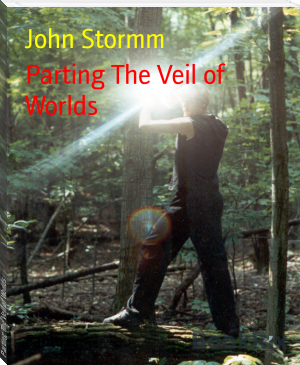The Well at the World's End: A Tale, William Morris [rainbow fish read aloud TXT] 📗

- Author: William Morris
Book online «The Well at the World's End: A Tale, William Morris [rainbow fish read aloud TXT] 📗». Author William Morris
He looked upon her tenderly, and said smiling: "And thou, my dear, art thou not a little wearied by what should weary a knight and one bred afield?" "Nay," she said, "seest thou not how I walk lightly clad, whereas I have left behind my mantle and cote-hardie?" Thereat she gathered up her gown into her girdle ready for the way, and smiled as she saw his eyes embrace the loveliness of her feet; and she spake as she moved them daintily on the flowery grass: "Sooth to say, Knight, I am no weakling dame, who cannot move her limbs save in the dance, or to back the white palfrey and ride the meadows, goshawk on wrist; I am both well-knit and light-foot as the Wood-wife and Goddess of yore agone. Many a toil hath gone to that, whereof I may tell thee presently; but now we were best on our way. Yet before we go, I will at least tell thee this, that in my knowing of these woods, there is no sorcery at all; for in the woods, though not in these woods, was I bred; and here also I am at home, as I may say."
Hand in hand then they went lightly through the hazel copse, and soon was the wood thick about them, but, as before, the Lady led unfalteringly through the thicket paths. Now Ralph spake and said: "It is good that thou lead me whither thou wilt; but this I may say, that it is clear to me that we are not on the way to the Castle of Abundance." "Even so," said she; "indeed had I come to thee there, as I was minded, I should presently have brought thee on the way which we are wending now, or one nigh to it; and that is that which leadeth to Hampton under Scaur, and the Fellowship of Champions who dwell on the rock."
Said Ralph: "It is well; yet will I tell thee the truth, that a little sojourn in that fair house had liked me better. Fain had I been to see thee sitting in thine ivory chair in thy chamber of dais with the walls hung round with thee woven in pictures—wilt thou not tell me in words the story of those pictures? and also concerning the book which I read, which was also of thee?"
"Ah," she said, "thou hast read in the book—well, I will tell thee the story very soon, and that the more since there are matters written wrong in the book." Therewith she hurried him on, and her feet seemed never tired, though now, to say sooth, he began to go somewhat heavily.
Then she stayed him, and laughed sweetly in his face, and said: "It is a long while now since the beginning of the June day, and meseems I know thy lack, and the slaking of it lieth somewhat nearer than Hampton under Scaur, which we shall not reach these two days if we go afoot all the way."
"My lack?" said he; "I lack nought now, that I may not have when I will." And he put his arms about her shoulders and strained her to his bosom. But she strove with him, and freed herself and laughed outright, and said: "Thou art a bold man, and rash, my knight, even unto me. Yet must I see to it that thou die not of hunger." He said merrily: "Yea, by St. Nicholas, true it is: a while ago I felt no hunger, and had forgotten that men eat; for I was troubled with much longing, and in doubt concerning my life; but now am I free and happy, and hungry therewithal."
"Look," she said, pointing up to the heavens, "it is now past two hours after noon; that is nigh two hours since we left the lawn amidst the hazels, and thou longest to eat, as is but right, so lovely as thou art and young; and I withal long to tell thee something of that whereof thou hast asked me; and lastly, it is the hottest of the day, yea, so hot, that even Diana, the Wood-wife of yore agone, might have fainted somewhat, if she had been going afoot as we twain have been, and little is the risk of our resting awhile. And hereby is a place where rest is good as regards the place, whatever the resters may be; it is a little aside the straightest way, but meseems we may borrow an hour or so of our journey, and hope to pay it back ere nightfall. Come, champion!"
Therewith she led north through a thicket of mingled trees till Ralph heard water running, and anon they came to a little space about a brook, grassy and clear of trees save a few big thorn-bushes, with a green ridge or bank on the other side. There she stayed him and said: "Do off thy war-gear, knight. There is naught to fear here, less than there was amidst the hazels." So did he, and she kneeled down and drank of the clear water, and washed her face and hands therein, and then came and kissed him and said: "Lovely imp of Upmeads, I have some bread of last night's meal in my scrip here, and under the bank I shall find some woodland meat withal; abide a little and the tale and the food shall come back to thee together." Therewith she stepped lightly into the stream, and stood therein a minute to let her naked feet feel the cold ripple (for she had stripped off her foot-gear as she first came to the water), and then went hither and thither gathering strawberries about the bank, while he watched her, blessing her, till he well nigh wept at the thought of his happiness.
Back she came in a little while with good store of strawberries in the lap of her gown, and they sat down on the green lip of the brook, and she drew the bread from her scrip and they ate together, and she made him drink from the hollow of her hands, and kissed him and wept over him for joy, and the eagerness of her love. So at last she sat down quietly beside him, and fell to speaking to him, as a tale is told in the ingle nook on an even of Yule-tide.
CHAPTER 3 The Lady Telleth Ralph of the Past Days of Her Life
"Now shalt thou hear of me somewhat more than the arras and the book could tell thee; and yet not all, for time would fail us therefor—and moreover my heart would fail me. I cannot tell where I was born nor of what lineage, nor of who were my father and mother; for this I have known not of myself, nor has any told me. But when I first remember anything, I was playing about a garden, wherein was a little house built of timber and thatched with reed, and the great trees of the forest were all about the garden save for a little croft which was grown over with high grass and another somewhat bigger, wherein were goats. There was a woman at the door of the house and she spinning, yet clad in glittering raiment, and with jewels on her neck and fingers; this was the first thing that I remember, but all as it were a matter of every day, and use and wont, as it goes with the memories of children. Of such matters I will not tell thee at large, for thou knowest how it will be. Now the woman, who as I came to know was neither old nor young in those days, but of middle age, I called mother; but now I know that she was not my mother. She was hard and stern with me, but never beat me in those days, save to make me do what I would not have done unbeaten; and as to meat I ate and drank what I could get, as she did, and indeed was well-fed with simple meats as thou mayest suppose from the aspect of me to-day. But as she was not fierce but rather sour to me in her daily wont in my youngest days so also she was never tender, or ever kissed me or caressed me, for as little as I was. And I loved her naught, nor did it ever come into my mind that I should love her, though I loved a white goat of ours and deemed it dear and lovely; and afterwards other things also that came to me from time to time, as a squirrel that I saved from a weasel, and a jackdaw that fell from a tall ash-tree nigh our house before he had learned how to fly, and a house-mouse that would run up and down my hand and arm, and other such-like things; and shortly I may say that the wild things, even to the conies and fawns loved me, and had but little fear of me, and made me happy, and I loved them.
"Further, as I grew up, the woman set me to do such work as I had strength for as needs was; for there was no man dwelt anigh us and seldom did I ever see man or woman there, and held no converse with any, save as I shall tell thee presently: though now and again a man or a woman passed by; what they were I knew not, nor their whence and whither, but by seeing them I came to know that there were other folk in the world besides us two. Nought else I knew save how to spin, and to tend our goats and milk them, and to set snares for birds and small deer: though when I had caught them, it irked me sore to kill them, and I had let them go again had I not feared the carline. Every day early I was put forth from the house and garth, and forbidden to go back thither till dusk. While the days were long and the grass was growing, I had to lead our goats to pasture in the wood-lawns, and must take with me rock and spindle, and spin so much of flax or hair as the woman gave me, or be beaten. But when the winter came and the snow was on the ground, then that watching and snaring of wild things was my business.
"At last one day of late summer when I, now of some fifteen summers, was pasturing the goats not far from the house, the sky darkened, and there came up so great a storm of thunder and lightning, and huge drift of rain, that I was afraid, and being so near to the house, I hastened thither, driving the goats, and when I had tethered them in the shed of the croft, I crept trembling up to the house, and when I was at the door, heard the clack of the loom in the weaving-chamber, and deemed that the woman was weaving there, but when I looked, behold there was no one on the bench, though the shuttle was flying from side to side, and the shed opening and changing, and the sley coming home in due order. Therewithal I heard a sound as of one singing a song in a low voice, but the words I could not understand: then terror seized on my heart, but I stepped over the threshold, and as the door of the chamber was open, I looked aside and saw therein the woman sitting stark naked on the floor with a great open book before her, and it was from her mouth that the song was coming: grim she looked, and awful, for she was a big woman, black-haired and stern





Comments (0)